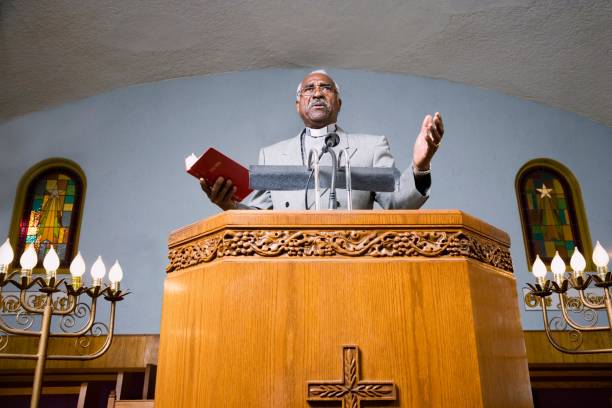(ThyBlackMan.com) We are in a teaching on a new and better covenant, and in this we need to understand the priesthood of Jesus Christ. We have a High Priest that covers us, who allows us to come out and do what we do in the church. A priest oversees the work of the temple. There are three significant things concerning the priesthood of Jesus Christ.
First, we must realize we were chosen before the foundation of the world. In other words, when we talk about how we found the Lord, we need to understand that He has never been lost. The Bible says He is omnipresent, that means He is everywhere at the same time. How then could God be lost when He is everywhere at the same time? What happened was you had a personal epiphany, I like to call it, and you realized that you needed a greater relationship with God Almighty.
Next, according to Revelation 13:8, not only were you chosen before the foundation of the world, but Jesus is the Lamb slain before the foundation of the world. So long before Adam and Eve, like we say when we marry people in one of the marriage vows—long before the tempter had touched the world or they ate of the forbidden fruit—long before the devil got into existence, got in the tree and tempted them to eat from the tree, guess what happened? God had already made a way of escape. He knew we were going to mess up long before we messed up. Like the Bible says in John 3:16, “For God so loved the world, that He gave His only begotten Son.” God is not mad at you. He might not like everything you do, but He is not mad at you. For years, people had you thinking God was a mean old man sitting on a throne waiting to send you to hell. As a matter of fact, when you started discerning and learning what the will of God is for your life, this becomes clear. Real faith begins where the will of God is known and understood. When I start understanding and learning what Jesus and done and who Jesus is, that is what makes it personal.

Jesus is our High Priest. His Priesthood is superior to all priesthoods. When we get into Hebrews, it gets a little thick because of all of the stuff God has in this—the Book of Hebrews. I don’t believe in just running by a scripture because the Bible says that man should not live by bread alone, but by every word that proceeded out of the mouth of God. That means that just one word, even an “and,” a comma, a “to,” or a semicolon has significance when it comes to the Word of God. You do not read the Bible like you read a novel or the newspaper because this is a life-giving source. He says, “My words are Spirit, and they give life.” “This is the Word of Life,” so whenever I am receiving the Word, there is prosperity in the Word. There is health in the Word; there is healing in the Word, whatever I need is in the Word of God. For the most part, people just want to reserve the things of God for church when God is concerned about every area of your life.
Look at Deuteronomy 29:9. “Keep therefore the words of this covenant, and do them, that ye may prosper in all that ye do.” God is concerned about every little detail of your life. But God is not intrusive. Sometimes your parents can be intrusive. We are going to come in your room. You aren’t going to lock any doors in my house. When you get a house, then I will knock when I come over. Being natural parents, we get a little investigative and it is good that you do. But God does not intrude upon your life. He says things to you like, “He that will, let him come.” “Submit yourself to the hand of the Almighty God.” God is not out here trying to force you to do His will. He is not out here trying to force you to hear His voice, to walk with Him, but as we yield to the Holy Spirit, we receive His leadership. I am telling you, this stuff is not just for church. It is for my whole life.
Matthew 6:33 says, “But seek ye first the kingdom of God, and his righteousness; and all these things shall be added unto you.” God is concerned about my whole life. God is going to add into my life. He has to be priority, and He says that everything I need will be added to my life. Joshua 1:6-8 “ Be strong and of a good courage: for unto this people shalt thou divide for an inheritance the land, which I sware unto their fathers to give them. Only be thou strong and very courageous, that thou mayest observe to do according to all the law, which Moses my servant commanded thee: turn not from it to the right hand or to the left, that thou mayest prosper withersoever thou goest. This book of the law shall not depart out of thy mouth; but thou shalt meditate therein day and night, that thou mayest observe to do according to all that is written therein: for then thou shalt make thy way prosperous, and then thou shalt have good success.”
Staff Writer; Dr. Henry W. Roberts, II
This man of god is the pastor/teacher of Word of Life Community Church of Whistler and Chickasaw, AL. One may contact him at; DrHWR@ThyBlackMan.com.

















“So long before Adam and Eve, like we say when we marry people in one of the marriage vows–long before the tempter had touched the world or they ate of the forbidden fruit–long before the devil got into existence, got in the tree and tempted them to eat from the tree, guess what happened?”
For thousands of years, the identity of the forbidden fruit eaten by Adam and Eve in the Garden of Eden story has been unknown. If the fruit is the traditionally believed apple, or another literal fruit, it would simply be called by its literal name, and not the fruit of the tree of knowledge of good and evil. Because eating a piece of this literal fruit would give only knowledge of the literal fruit’s taste, not knowledge of good and evil. So…
If literal fruit is not the fruit in the world’s oldest and greatest mystery story, then what is the fruit? Why are the two super secret trees assigned the mystical names “tree of life” and “tree of knowledge of good and evil?” Is the talking snake Evil Angel speaking words, or does the talk represent something more subtle? Could two men have yielded to Adam and Eve’s temptation? Why would a smart man and woman eat from a forbidden fruit tree, instead of from one that is NOT forbidden, especially when both “trees” are right next to each other in the center of the Garden? How is the couple’s disobedience of the very first commandment to be fruitful and multiply while in the Garden linked to their decision to make only fig leaf aprons, instead of complete clothing, in this incomprehensible narrative, with its guesswork of interpretations and its hints of sexual behavior?
A lone exegesis combines all six questions for one answer, using only evidence in the dreamlike Bible chronicle, for an intelligent and sensible explanation of the world’s oldest and greatest fruit mystery. This evidence in the Genesis 2 and 3 Bible story identifies the fruit as carnal pleasure. The solid evidence offers no support for historical fruit identity opinions. But, even with the evidence, is this unique exegesis the correct exegesis?
*****
Bad Day in the Garden
They eat the fruit, but what do they eat?
We lift the veil, for a wary peek.
Through a forest of mystery hiding it all,
We see a body, naked and weak.
“The Random House Dictionary of the English Language” defines allegory as “a representation of an abstract, or spiritual meaning through concrete, or material forms; figurative treatment of one subject under the guise of another.” It’s difficult to imagine a better definition than this one. But it’s even more difficult to imagine anyone making any sense of the second and third chapters of Genesis by taking everything in the two chapters literally. When was the last time someone went into a grocery store and bought some knowledge of good and evil fruit?
Although most elements in Genesis 2 and 3 represent something else, there are a number of facts in the story that can be taken at face value.
1. Adam and Eve have real human bodies.
2. Adam and Eve are not wearing any clothes.
3. God has forbidden them to do something.
4. They have disobeyed God.
5. God has punished them both for their disobedience.
The above five facts form the basis for the religious beliefs of many people who are not interested in allegories, and of many who are. But there is an all-important sixth fact, the knowledge of which would do no harm to anyone’s religious beliefs.
This BODY is the Garden in whose center grow
The two famous trees, but nowhere a weevil.
Here is the tree of life and the one
Of knowledge of good and knowledge of evil.
This sixth fact is the key that unlocks the door, opens it, and solves the mystery: both trees are in the center of the garden. This fact is so important that it is mentioned, not just once, but twice: Genesis 2:9 and Genesis 3:3. (In Genesis 3:3 the tree of life is not specifically mentioned, but we know it is there, because we were told it is there in Genesis 2:9.) Technically, both trees could not occupy the center of the garden at the same time, unless they were entwined. But, there is no evidence for entwinement here. What these two verses tell us, is that both trees are very close to each other.
Because the two trees are right next to each other
Care must be taken to avoid the one bad.
For the fruit of both trees is pleasure,
So the pleasure is there to be had.
To be fruitful and multiply eat from the first.
But eat from the second and no one conceives.
So here we go now: one, two, three–
Pleasure, shame, fig tree leaves.
God’s first commandment to Adam and Eve was to be fruitful and multiply. To be fruitful and multiply, eat from the first. But eat from the second and no one conceives. Adam and Eve eat from the forbidden second tree, and as a result, produce no children while in the Garden of Eden. Instead of engaging in the procreative process as commanded, they use, as a procreative organ, a delivery system designed for delivery, but not for delivery of children.
This material is not just a brain teaser, nor hopefully is it an example of sophomoric cleverness. It’s really quite simple: explanations of certain fearful mysteries buried in the story for thousands of years, have been exhumed by using verse, rather than prose, to more easily reveal these explanations. The quality of the verse is both irrelevant and unimportant.
Please note: some parts of the story are totally acceptable as both symbolic and literal narrative, at least up to a point. For example, the symbolic garden can be juxtaposed with a literal garden, complete with fruit trees. Other sections can be taken as literal accounts, extra material such as Genesis 3:20-21, in which Adam gives Eve her name and God shows compassion for the pair by clothing them in animal skins for warmth, before evicting them from the garden, symbolic and literal, into the graceless and cold outside world where they forfeit their gift of eternal life they would have had if they had eaten only from the tree of life. (Genesis 3:2,22)
*****
Preliminary Wrap
The Genesis story tells us in Genesis 2:9 and 3:3 both trees are in the center of the Garden. So the forbidden Tree of Knowledge of Good and Evil is right next to the allowed tree, the Tree of Life, and its fruit. If the forbidden fruit from the forbidden tree is literal fruit, the eating of this fruit would give only knowledge of the fruit’s taste, not knowledge of good and evil. But the covering of the genitals with fig leaf aprons following the eating of the “fruit” does indicate sudden acquisition of knowledge of good and evil, a knowledge that results in a certain type of shame. It is difficult to understand how eating literal fruit results in this type of shame. And it is difficult to understand how normal and necessary physical relations between Adam and Eve result in this type of shame, since the first and only specified commandment to them is to “Be fruitful and multiply” in the Garden, a commandment they disobey, because no children are produced until after the eviction from Eden, and after they have normal and necessary physical relations for the first time in Genesis 4:1. But their obedience is too late: guardian cherubim and a flaming sword prevent reentry into the Garden.
Adam and Eve execute a double disobedience when they eat of the forbidden fruit–they fail to procreate, by doing what they are forbidden to do. And they fail to procreate, by not doing what they are commanded to do. Both failures occur simultaneously. The fruit in the Garden of Eden is not forbidden carnal pleasure, but forbidden nonprocreative carnal pleasure–nonprocreative carnal pleasure derived from a specific forbidden physical act.
*****
Postscript: Traditional Identity of The Fruit Persists
The widespread belief that the fruit is an apple has its genesis in the 12th century, based on Saint Jerome’s earlier 4th century Vulgate translation, in which he substituted the later corrected “malum,” meaning “apple,” for “malus,” meaning “evil,” to identify the forbidden fruit Adam and Eve ate. And this error remains the apex identity reaching us in the 21st century, still based on no evidence for the existence of a literal fruit. But to end on a positive note, the acceptance of the evidence-based exegesis of the identity of the fruit in the world’s oldest mystery story is at last making headway, as increasing numbers of people manage to set aside the emotions and feelings spinning them in circles, and acknowledge–at least until a better exegesis appears–the evidence in the Bible story of the talking fruit snake. This long-forgotten exegesis explains everything as it superimposes the allegorical Eden Garden upon its literal counterpart. The exegesis offers enlightenment for the untrue and oft repeated, “Only God knows what fruit they ate.” Yes, a Deity would know what “fruit” they “ate,” but the evidence in the Genesis story reveals the Deity’s knowledge of the fruit’s identity to anyone who wishes to know, and has the courage to overcome their emotional resistance and uneasiness resulting from being exposed to this knowledge. Would this exposure be eating forbidden knowledge once again? Would a Deity want us to remain ignorant of the Genesis story’s meaning? No to both questions, because our garden is not their Garden–we are not living in the Garden of Eden’s state of grace. And secondly, the evidence in the story clearly tells us that Adam and Eve did not disobey the “be fruitful and multiply” Genesis 1:28 commandment for the purpose of acquiring knowledge of good and evil. Their acquisition of this knowledge was a byproduct of their disobedient behavior, which was to experience nonprocreative physical pleasure by eating allegorical fruit from the allegorical wrong tree in the center of an allegorical garden, while at the same time quite possibly living in a literal garden with literal fruit trees and literal snakes that do not talk to women.
*****
Just Another Doctrinal Neologism?
Is this exegesis beginning with Genesis 1:28, continuing through Genesis 2 and 3, and concluding with Genesis 4:1 just another neologism? No, it is not. If the exegesis is only another neologism, but not the exhumation and revelation of the original story, then not only do the individuals who first hear the story have absolutely no idea what the story means, but neither does the original storyteller. Imagine the storyteller saying, “Sometimes I just say things. I don’t know what they mean.” It is somewhat difficult to imagine this event happening.
If it does happen, then the original storyteller tells the story while having no understanding of the words being said, unless the storyteller decides to deliberately disguise and beautify the story, to hide its true meaning. This will certainly require complex ability, to intentionally mystify at the very dawn of human consciousness. It will also require the original listeners to not ask the original storyteller any questions about this new story–a story that makes no sense. So, the mystification probably happens later. And, of course, when it does, everyone will know the meaning of the entire story. For a while.